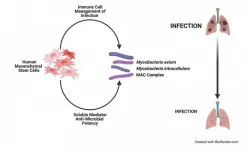Algorithms improve how we protect our data
New algorithms are much better at estimating the security level of encrypted data.
2021-05-04
(Press-News.org) Daegu Gyeongbuk Institute of Science and Technology (DGIST) scientists in Korea have developed algorithms that more efficiently measure how difficult it would be for an attacker to guess secret keys for cryptographic systems. The approach they used was described in the journal IEEE Transactions on Information Forensics and Security and could reduce the computational complexity needed to validate encryption security.
"Random numbers are essential for generating cryptographic information," explains DGIST computer scientist Yongjune Kim, who co-authored the study with Cyril Guyot and Young-Sik Kim. "This randomness is crucial for the security of cryptographic systems."
Cryptography is used in cybersecurity for protecting information. Scientists often use a metric, called 'min-entropy', to estimate and validate how good a source is at generating the random numbers used to encrypt data. Data with low entropy is easier to decipher, whereas data with high entropy is much more difficult to decode. But it is difficult to accurately estimate the min-entropy for some types of sources, leading to underestimations.
Kim and his colleagues developed an offline algorithm that estimates min-entropy based on a whole data set, and an online estimator that only needs limited data samples. The accuracy of the online estimator improves as the amount of data samples increases. Also, the online estimator does not need to store entire datasets, so it can be used in applications with stringent memory, storage and hardware constraints, like Internet-of-things devices.
"Our evaluations showed that our algorithms can estimate min-entropy 500 times faster than the current standard algorithm while maintaining estimation accuracy," says Kim.
Kim and his colleagues are working on improving the accuracy of this and other algorithms for estimating entropy in cryptography. They are also investigating how to improve privacy in machine learning applications.
INFORMATION:
[Attachments] See images for this press release:

ELSE PRESS RELEASES FROM THIS DATE:
2021-05-04
University of South Australia researchers have identified an enzyme that may help to curb chronic kidney disease, which affects approximately 700 million people worldwide.
This enzyme, NEDD4-2, is critical for kidney health, says UniSA Centre for Cancer Biology scientist Dr Jantina Manning in a new paper published this month in Cell Death & Disease.
The early career researcher and her colleagues, including 2020 SA Scientist of the Year Professor Sharad Kumar, have shown in an animal study the correlation between a high salt diet, low levels of NEDD4-2 and advanced kidney disease.
While a high salt diet can exacerbate some forms of kidney disease, until now, researchers did not realise ...
2021-05-04
Pioneering neural recordings in patients with Parkinson's disease by UC San Francisco scientists lays the groundwork for personalized brain stimulation to treat Parkinson's and other neurological disorders.
In a study published May 3rd in Nature Biotechnology, UCSF Weill Institute for Neurosciences researchers implanted novel neurostimulation devices that monitor brain activity for many months, with and without deep brain stimulation (DBS) therapy. Pairing the brain recordings with wearable monitors of movement, they identified patterns of brain activity corresponding to specific movement abnormalities associated with Parkinson's. Their research provides the first ...
2021-05-04
HOUSTON - Researchers have found the right formula for mixing a cement that does double duty as a structural material and a passive photocatalytic water purifier with a built-in means of replenishment: simply sand down the material's surface to refresh the photocatalytic quality.
They found this recipe using a few very precise physical laboratory experiments whose data were then greatly amplified using a computational method called combinatorics that tested thousands of combinations of cement composites and their photocatalytic qualities.
The results, say the researchers from C-Crete Technologies and Rice University, indicate ...
2021-05-04
Blood may seem like a simple fluid, but its chemistry is complex. When too much potassium, for instance, accumulates in the bloodstream, patients may experience deadly irregular heart rhythms.
Cardiovascular scientists at Virginia Tech's Fralin Biomedical Research Institute at VTC are studying why.
In a new study, published in Pflügers Archiv European Journal of Physiology, the research team led by Steven Poelzing, associate professor at the institute, describes how subtle changes in potassium, calcium, and sodium levels regulate heartbeats.
Poelzing ...
2021-05-04
DALLAS (May 3, 2021) - Researchers from the Center for BrainHealth® at The University of Texas at Dallas are investigating a potential new early indicator of the decline toward Alzheimer's disease: measuring the energy metabolism of the living human brain using cutting-edge imaging techniques.
The scientists devised a unique way to illustrate energy consumption and reserves in the brain with phosphorus magnetic resonance spectroscopy using an ultra-high-field 7 Tesla MRI scanner. Their results suggest that neurological energy metabolism might be compromised in mild cognitive impairment (MCI), the stage of decline between healthy ...
2021-05-04
A study published today in Nature Communications shows that the drug rucaparib has been effective in treating certain types of ovarian cancers if used early in treatment, after a diagnosis, and before the cancer cells build up a resistance to chemotherapy.
Rucaparib is in a relatively new class of drugs - Poly(ADP-ribose) polymerase or PARP inhibitors - which have been approved for therapy in ovarian cancers. This study provides insights into both how the cancers resist treatments, and which patients may respond favorably to the drug, said lead author Dr. Elizabeth Swisher, a UW Medicine ...
2021-05-04
Durham, NC - A study released today in STEM CELLS Translational Medicine offers hope for those suffering from a chronic, difficult to treat condition called non-tuberculous mycobacteria (NTM) lung infection. The study describes how researchers at Case Western University developed a new model of NTM lung infection and then used it to show how effective human mesenchymal stem cells (hMSCs) are in treating this condition - and even which donor cells might be best for doing so.
"The potential to use human mesenchymal stem cells to treat difficult lung infections is promising," said Anthony Atala, M.D., Editor-in-Chief of STEM ...
2021-05-04
PULLMAN, Wash. -- Professor Arda Gozen looks to a future someday in which doctors can hit a button to print out a scaffold on their 3-D printers and create custom-made replacement skin, cartilage, or other tissue for their patients.
Gozen, George and Joan Berry associate professor in the Washington State University School of Mechanical and Materials Engineering, and a team of researchers have developed a unique scaffolding material for engineered tissues that can be fine-tuned for the tricky business of growing natural tissue. They report on their research in the journal, Bioprinting. The team also includes researchers from WSU's ...
2021-05-04
Dating violence - physical, sexual, psychological or emotional within a relationship, including stalking - is pervasive on college campuses with far-reaching health implications. One in five women experience a sexual assault in college and students living in sorority houses are three times more likely to experience rape. College students are vulnerable to dating violence because of the influence of their social and living environments.
Researchers from Florida Atlantic University's College of Education in collaboration with Sacred Heart University conducted a study to understand the dating violence experience and perpetration of college-age women, ...
2021-05-04
Astronomers have identified more than 4,000, and counting, confirmed exoplanets -- planets orbiting stars other than the sun -- but only a fraction have the potential to sustain life.
Now, new research from UBC's Okanagan campus is using the geology of early planet formation to help identify those that may be capable of supporting life.
"The discovery of any planet is pretty exciting, but almost everyone wants to know if there are smaller Earth-like planets with iron cores," says Dr. Brendan Dyck, assistant professor of geology in the Irving K. Barber Faculty of Science and lead author on the study.
"We typically hope to find these planets in the so-called 'goldilocks' or habitable ...
LAST 30 PRESS RELEASES:
[Press-News.org] Algorithms improve how we protect our data
New algorithms are much better at estimating the security level of encrypted data.






